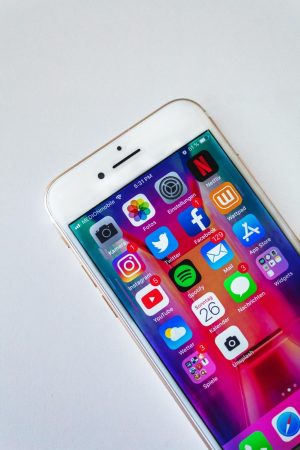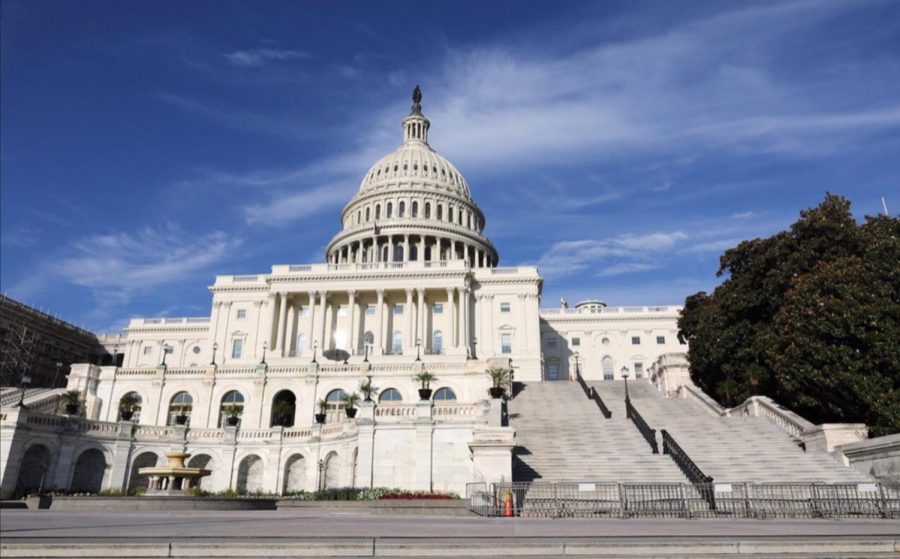Social Media’s Deadly Influence on Political Stance
cytis via pixabay.com – Supplied by Kayla Smith ‘24
The Capitol of the United States – The latest victim of political extremism fueled by social media influence.
In his Inauguration speech, President Joe Biden expresses, “We must end this uncivil war. That pits red against blue, rural versus urban, Conservative versus Liberal. We can do this. If we open our souls, instead of hardening our hearts, if we show a little tolerance and humility and if we’re willing to stand in another person’s shoes…[1]” These words could not better summarize the condition of the United States. After months of social media platforms perpetuating the conspiracy theory of a “stolen presidential election,” we all witnessed a violent attack on the U.S. Capitol and democracy itself. The people that participated in these illegal events are domestic terrorists, many of whom have been radicalized by their social media feeds.
The social media platforms we interact with are more involved with how we think and view the world than we realize. If it wasn’t for my Instagram feed, I do not believe that I would have fully understood the Black Lives Matter movement, or known about it until a friend or my parents informed me. And if I hadn’t clicked on the Instagram stories of my friends, I wouldn’t have known about the Beirut explosion in Lebanon[2]. Keep in mind, these are only a few examples. Isn’t that concerning? How clueless and ignorant I am about current events in the world, unless I see someone post about it or get told through some other source. Of course, depending on how I find out or who tells me would greatly sway my own opinion.
Let me further explain what I mean. My dad is a cop. If he had first told me about the Black Lives Matter movement and the protests, I could have possibly supported the Blue Lives Matter movement[3]. It’s a bit more complicated than that though. I’ve always believed that I am racially inclusive and open when making friends and I’ve always tried to put myself in the shoes of others. Although having a parent who’s in law enforcement definitely helped me see the flipside of the coin. However, not everyone sees both perspectives, and that’s mainly due to their social media feed.

Platforms such as Instagram[4], Twitter[5], FaceBook[6], Snapchat[7], and TikTok[8] have structured algorithms which are designed to track what you click on, comment on and like, in hopes of increasing your screen time and usage. Through tracking your activity on an app, these platforms are able to push out more posts and videos that are similar. This may seem creepy, but mostly harmless right? Wrong. Unless you’re actively searching for something, you’re not going to see it in your feed.
So what are you missing? In 2011 at a TED Talk[9], Eli Parisner[10] warned Americans about online “filter bubbles.” He defined “filter bubbles” as “your own personal, unique universe of information that you live in online.” However, he also said, “What’s in your filter bubble depends on who you are and what you do. But the thing is that you don’t decide what gets in. And more importantly, you don’t actually see what gets edited out.” These “filter bubbles” are quite active in one’s political viewpoint.
The FaceBook algorithm will “filter” out or remove posts which it considers irrelevant in shaping your unique and personal feed. So if you look at a post that’s Conservative, or follow some Conservative friends but you’re more Liberal, over time the algorithm will slowly begin to remove all Conservative posts and friends until your feed is fully Liberal based and vice versa. Once you’re fully immersed within your bubble, it’s very easy to stretch the bubble out to include other aspects of your life in it. It’s not difficult to only surround yourself with friends who have the same political views, or seek relationships with people who have the same beliefs. However, it’s become increasingly easier to do so with today’s technology.
Becoming an extremist is not impossible and it can happen to anyone. Youtube[11] has steered unsuspecting viewers towards extremism through a business model that rewards provocative videos with exposure and advertising money. The platform’s recommendation algorithm guides viewers down predetermined paths and keeps them glued to their screens. A peek into far right chat rooms reveals Youtube as the most frequent cause for members converting to far right beliefs. You may be familiar with Caleb Cain[12], a Liberal college drop out from Appalachia, who got dragged into far right extremism while seeking self-help on Youtube. Caleb only managed to escape his radicalization by being dragged to the far left years later, also via Youtube.
Some of you may have recently watched the Social Dilemma[13], a Netflix documentary. The documentary explains how we, the users of social media platforms, are products or zombies if you will, that are being exploited for the financial gain of unregulated tech corporations. Democracies are being threatened worldwide through the spreading of conspiracy theories across social media platforms. Russia and China are spreading rumors and conspiracy theories which have influenced elections, including the 2016 U.S. presidential election. Conspiracy theories swirling around the recent presidential election, as well as calling Coronavirus a hoax created by Democrats, have been amplified by social media.
The growing issue of political polarization can be largely attributed to social media. More than one third of Republicans believe that Democrats are a threat to the nation, and more than one fourth of Democrats are saying the same thing about the Republicans. Former Director of Monetization at FaceBook and Former President of Pinterest, Tim Kendall[14], believes that if social media platforms do not become regulated and reformed, civil war is possible. Tristan Harris[15]Former Google Design Ethicist and Co-Founder and President of the Center for Humane Technology, explained that there is a bias towards false information, because the truth is boring and disinformation is more profitable. For example, fake news on Twitter spreads six times faster than true news.
In order to stop ourselves from continuing to live in these bubbles and hating those with opposing beliefs, we must walk directly into the flames and be willing to get uncomfortable. The bubble will never pop until we force ourselves to diversify our social circles and take charge with our social media feed. That’s right, I’m saying go befriend some “radical left-wingers” or “Trumpers.” Just have a conversation with someone who’s outside of your political party.
In a perfect world, your Instagram or FaceBook feed would reflect both the perspective of a Conservative and the perspective of a Liberal, as well as provide news from both sides equally. Since the algorithms are not programmed to do so, you need to become in charge of seeing the other perspectives and news. Go stalk the Instagrams or Twitters of other political candidates in this year’s past election. This may seem like an impossible task or straight up insane, but once you do you’ll feel more wise, less tense, and you’ll understand others more.
[1] News, CNN. Watch President Joe Biden’s Full Inauguration Speech . 20 Jan. 2021, www.youtube.com/watch?v=LGukNIEIhTU . Accessed 21 Jan. 2021.
[2] Balkiz, Ghazi, et al. “Huge Explosion Rocks Beirut, Injuring Thousands across Lebanese Capital.” CNN, Cable News Network, 5 Aug. 2020, www.cnn.com/2020/08/04/middleeast/beirut-explosion-port-intl/index.html.
[3] “Our Mission.” Blue Lives Matter NYC, Blue Lives Matter NYC , 2021, bluelivesmatternyc.org/pages/frontpage.
[5] Twitter (@Twitter) | Twitter
[6] Facebook – Log In or Sign Up
[8] Watch trending videos for you | TikTok
[10] Pariser, Eli. “Beware Online ‘Filter Bubbles.’” TED, TED Talk, Mar. 2011, www.ted.com/talks/eli_pariser_beware_online_filter_bubbles.
[12] Roose, Kevin. “The Making of a YouTube Radical.” The New York Times, The New York Times, 8 June 2019, www.nytimes.com/interactive/2019/06/08/technology/youtube-radical.html?mtrref=oceanhero.today&gwh=8DAAE13E94DDA8E776F0E74865D230D6&gwt=regi&assetType=REGIWALL.
[13] The Social Dilemma Official Trailer Netflix https://www.youtube.com/watch?v=uaaC57tcci0
[14] Garrity, Katie. “Tech CEO Tim Kendall (Ironically) Wants Everyone to Put Down Their Freaking Phone.” Distractify, Distractify, 11 Sept. 2020, www.distractify.com/p/tim-kendall-social-dilemma.
[15] About Tristan Harris https://www.tristanharris.com

